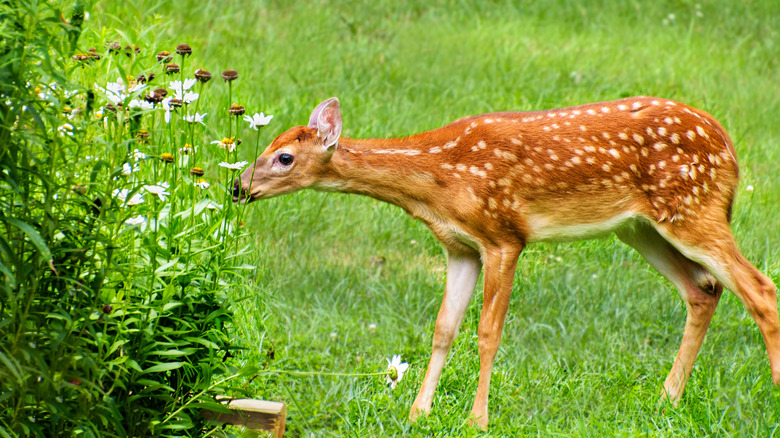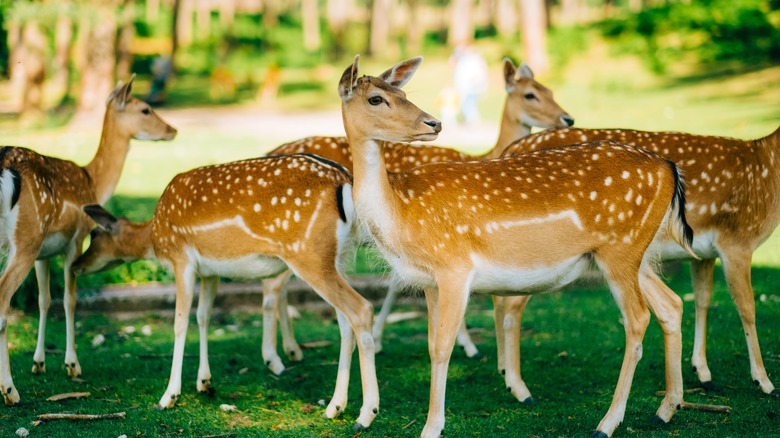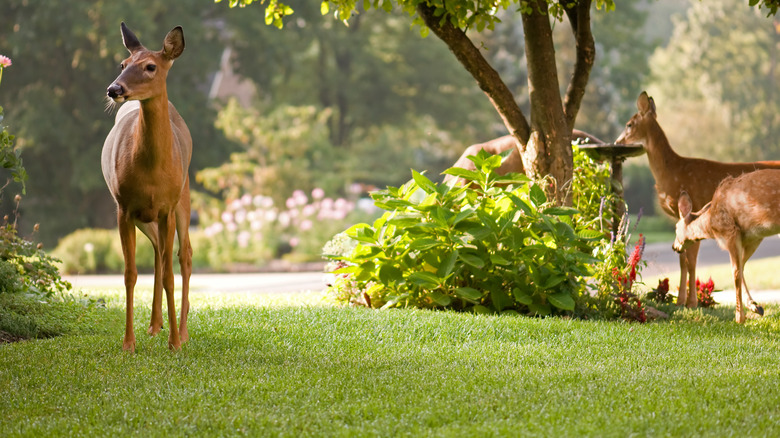Why You Should Rethink Using Plants To Keep Deer Out Of The Garden
If you love watching deer from your window, keeping these creatures out of your garden might be a concept that would never cross your mind. If you don't usually get wildlife around your home, sighting deer in your yard could be a welcome treat on a boring day. These animals are adorable and usually gentle creatures with a hint of shyness to their personalities. However, for those who regularly find them encroaching into their territory and causing mayhem, that sentiment is likely long gone. Gardeners are sometimes advised to deter foraging deer from their gardens by planting deer-resistant plants, but you might want to rethink this solution because it isn't always effective and could therefore could end up wasting your time.
Deer are beautiful animals, but that doesn't always excuse the damage they inflict on residential gardens. These doe-eyed cuties can be a real nuisance when they feed on your plant leaves, disrupt your terrain by digging up soil, and leave your meticulously-curated space looking disheveled. Gardeners resort to growing plants that deer aren't very fond of in a bid to discourage their presence. There's a lengthy list of these plants including lavender, boxwood, and yarrow. The downside to this is that a the deer may gobble them up anyway.
There are no deer-proof plants
Have you ever been so hungry that you gave in and wolfed down the most readily-available food near you, even if it wasn't your favorite food? Most likely. In the same way, keeping deer away with plants is not always effective because some deer will still have at them. Fully deer-proof plants technically don't exist, hence why relying on that idea to save you from a horde of foraging animals is not the best route to take. Experts at the New Jersey Agricultural Experiment Station have begun to classify plants based on how likely they are to be damaged by deer. Plants like American holly and cactus are known as "rarely damaged," while tulips and geraniums are classified as "frequently severely damaged." Unfortunately, not even this system is 100% reliable because deer have ever-changing palates. If you have a deer problem, then you would do well to turn to other tried and tested solutions.
However, while placing all your hope on the deer-resistant plant method might not yield you the best results, it isn't totally useless. Some of these plants do manage to steer deer away while beautifying your yard, and they could also be useful to your pets. For instance, Nepeta cataria, which is commonly known as catnip, is beloved by cats but abhorred by deer.
Deer-resistant plants depend on environmental factors
What deer eat fluctuates depending on personal and environmental factors. Just because most deer are known to steer clear of a particular plant doesn't mean they can't make exceptions or change their minds. One popular contributing factor to the failure of deer-resistant plants is the density of the local population. If you live in an area with a lot of these animals, there's a high chance that they'll eat all your plants because there'll be lots of competition within the species for the most-loved plants. Those that don't get ahold of the best crops may eat the less-favorable types to keep from starving. Another factor is deforestation. Loss of habitat and food sources means deer won't have as many choices. If your area is facing food scarcity, the four-legged cuties are more likely to chow down in your garden.
Finding out that deer-resistant planting won't work in your area isn't the end of the world. You can still salvage your garden with other deterrents, and one such solution is fencing. Because deer like to jump and are great at it, you're going to need a tall fence, one that's at least 10 feet high. Identifying the solution that works best for you and your home will likely be a trial-and-error endeavor.


